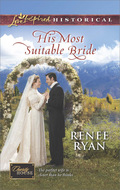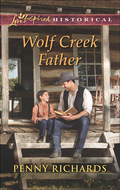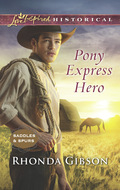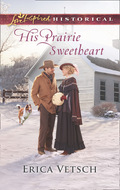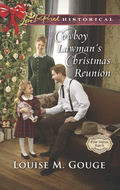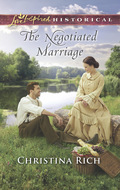Książki nie można pobrać jako pliku, ale można ją czytać w naszej aplikacji lub online na stronie.
Czytaj książkę: «His Precious Inheritance»
The Baby Surprise
After an adorable toddler arrives on her boss’s doorstep, Clarice Gordon’s job offer transforms from full-time journalist to part-time nanny. Clarice agrees to care for Charles Thornberg’s little brother as long as she can continue writing. But soon Charles stirs emotions in Clarice that are far from professional…
Charles never dreamed he had a long-lost brother, but he’ll do everything to ensure the little one is loved. And Clarice amazes him with the warmth and care she shows the boy—so different from the career women he’s known. Charles doesn’t like surprises in his neatly ordered life, though thanks to this one, he may have stumbled upon the family he’s always wanted…
What was he thinking?
He was lonely, that was all. But he had family now. Jonathan was enough.
A whistle sounded in the distance. He looked down at his brother and smiled. “You hear that whistle, Skipper? That’s another steamer telling us to get out of her way, that she’s coming into the dock.”
“Boat!” Jonathan twisted around and pointed out on the lake.
“That’s it. That’s the steamer.” He looked out over the water, focused his attention on the other vessel.
Clarice turned to face them, smiled and straightened Jonathan’s stocking. He glanced down and met her gaze, and the oneness, the sharing of the moment he’d craved, happened.
“I think he could wiggle right out of his clothes.”
There was a proprietary tone, a touch of motherly pride in her soft words. She smiled, and the warmth in her eyes, the gentleness in the curve of her lips, sailed right by his common sense and lodged firmly in his heart.
Award-winning author DOROTHY CLARK lives in rural New York. Dorothy enjoys traveling with her husband throughout the United States doing research and gaining inspiration for future books. Dorothy believes in God, love, family and happy endings, which explains why she feels so at home writing stories for Love Inspired Books. Dorothy enjoys hearing from her readers and may be contacted at dorothyjclark@hotmail.com.
His Precious Inheritance
Dorothy Clark

MILLS & BOON
Before you start reading, why not sign up?
Thank you for downloading this Mills & Boon book. If you want to hear about exclusive discounts, special offers and competitions, sign up to our email newsletter today!
Or simply visit
Mills & Boon emails are completely free to receive and you can unsubscribe at any time via the link in any email we send you.
Trust in the Lord with all thine heart;
and lean not unto thine own understanding.
—Proverbs 3:5

To my husband and sons—you all continually demonstrate the gentleness and safety to be found in a man’s strength. Thank you for teaching me how to write real heroes.
And Sam. Once again, you’ve gone that “second mile” and hung in there with me through the deadline crunch. You’re a true cowboy hero—always galloping to a lady’s rescue. Thank you.
Commit thy works unto the Lord,
and thy thoughts shall be established.
Your Word is truth. Thank You, Jesus.
To God be the glory
Contents
Cover
Back Cover Text
Introduction
About the Author
Title Page
Bible Verse
Dedication
Chapter One
Chapter Two
Chapter Three
Chapter Four
Chapter Five
Chapter Six
Chapter Seven
Chapter Eight
Chapter Nine
Chapter Ten
Chapter Eleven
Chapter Twelve
Chapter Thirteen
Chapter Fourteen
Chapter Fifteen
Chapter Sixteen
Chapter Seventeen
Epilogue
Dear Reader
Extract
Copyright
Chapter One
August 1878 Chautauqua Lake, New York
“What is amusing you, Clarice?”
Clarice Gordon met her mother’s gaze in the mirror and her smile turned into a grin. “I was remembering the flabbergasted look on the milliner’s face when I refused to have any adornment put on my hat.” She settled the brown felt forward of the thick knot of hair at the back of her head and anchored it in place.
“Some brown-eyed Susans would add a touch of color. A cluster of them at the front would look pretty.”
A wistful note shadowed her mother’s voice. “No doubt. But I’m not interested in looking pretty, Mama.” She adjusted the three tabs of fabric that fell like a flat cravat from the base of her high stand-up collar, then tugged the hem of her bodice down to straighten the row of buttons that marched from beneath the tabs to her narrow waist. Plain and serviceable. Perfect. She smoothed her hands over the front of the long skirt and turned from the mirror. “I’m a career woman. I want the men I encounter in my endeavors to take me seriously, not to court me.” She left the rest unsaid.
“Not all men are like your father and brothers, Clarice.”
The resignation in her mother’s voice plucked at her heart. Yet the mention of her father and brothers chased any commiseration away. “I suppose not, Mama.” It was the best she could do by way of capitulation.
The hardness in her heart would not yield to any appeal for softening. One look at her bedridden mother assured that. It also affirmed her determination to never marry and put herself under the grinding thumb of a man.
She pulled on her half gloves and walked to the bed. “Lean forward and I’ll fluff your pillows before I leave.” She pulled them from behind her mother, pummeled and replaced them. “Let’s see, you have fresh water to drink... And Mrs. Duncan will come in throughout the day with meals and to help you with your private needs...”
“Stop fretting, Clarice. I’ll be fine. I’m not used to being fussed over.”
“Yes, I’m aware of that. But that’s the reason I brought you here to live with me, Mama. So I could take care of you.” She looked down at her mother’s work-worn hands resting against the quilt that covered her legs and tried for her sake to swallow back the bitterness. A wasted effort. The resentment she held against her father for working her mother into a frail, bedridden woman was a part of her. Her brothers were as bad with their selfish demands. But her father’s cruelty was the example they followed.
Her face drew taut, as it always did at the memories. Her father and brothers had treated her mother as their personal slave. And they’d tried to do the same to her.
God bless Miss Hartmore for rescuing her and making her education possible! If her teacher hadn’t whisked her away from her father’s tyrannical grasp, she would still be tending the garden and chickens and pigs and scrubbing piles of their filthy oil-coated work shirts and pants and socks with no hope of escape.
And for Miss Hartmore saving her mother all these years later. When she thought of her mother lying on the grass by a basket of wet laundry and unable to rise...and of her father declaring he had no use for a cripple and wanted no part of the burden of caring for one! His own wife, who had destroyed her health carrying out his demands.
She spun from the bed and walked through the archway to the desk in the small turret that formed the outside wall of her room, trembling from head to toe. She supposed she should be grateful for her father’s callous attitude, as he’d made no objection when Miss Hartmore took her mother into her home. That had made it easy for her to go and bring her mother back here to the boardinghouse where she could care for her. If only she could have done so sooner! But the train fares had taken all she’d been able to set aside for the purpose and a bit more. Her stomach churned. How was she to manage her mother’s care? How was she to pay for the increase in room and board?
She snatched her writing box off the desk and headed for the bedroom door, the short train of her skirt bouncing across the floor with her jerky stride.
“You need to let go of the anger, Clarice. You need to—”
“Please don’t talk to me of forgiveness, Mama!” She whipped around and stepped to the bed. “You’re lying there unable to walk because your husband and sons worked you to the point of crippling you. They are cold, cruel, heartless men. They don’t deserve forgiveness!”
“If they deserved it, they wouldn’t need it.” The hard calluses on her mother’s fingers and palms rasped against the soft skin of her hand. “It’s not for their sake you need to forgive them, Clarice. It’s for yours—and mine. I couldn’t bear it if the anger you hold inside ruins your life.”
“The way my father tried to?” She choked back a torrent of useless words. “The anger won’t hurt me, Mama. It has driven me to succeed, to become a teacher, like Miss Hartmore.” She took a calming breath and curved her lips into a smile. “And I truly enjoy writing articles for newsletters and magazines. I’m hoping that one of my articles will one day favorably impress the editor of a daily newspaper, and he will offer me a job as a journalist.” Her smile faded. “Though that’s not likely. It’s a man’s world—at present.”
“And you believe this suffrage movement you talk about will change that? Women have been trying to gain equal rights for years with little success.” Her mother shook her head. “Only God can change a man’s heart, Clarice.”
There was no point in trying to debate with her mother about God. “Well, perhaps He is using the suffragists to do so. Oh, I almost forgot...” She reached into her pocket, fingered the two coins she had left after paying the extra board for her mother then pulled out one of them. “Here, Mama, you may need something when I’m not here to go to the store. If so, I’m sure Mrs. Duncan will fetch it for you.” She leaned down and kissed her mother’s cheek. “I have to hurry or I’ll miss the steamer for Fair Point. I’ll be back tonight, Mama. Mrs. Duncan will look in on you.” She relaxed her knuckle-aching grip on her writing case and hurried out the door.
* * *
Charles Thornberg buttoned the starched collar and cuffs onto his fresh white shirt then opened the small drawer in the center of his chestnut wardrobe. Light glinted on the silver pocket watch with its attached fob and the pair of silver-framed carnelian cuff links that rested there. The silver initials set into the brownish-red stones of the links gleamed up at him. TJT. Thomas Jefferson Thornberg.
Charles lifted the cuff links out of the drawer and stared down at them resting on his hand—all that he had left of his father, thanks to his mother’s ambition and incompetence. She had lost everything else, including their house and furnishings, when she’d taken over the running of his father’s prosperous investment business on his death and driven it into bankruptcy. Of course, he was already living in the boarding school by then. She’d sent him away the day after they buried his father.
His fingers curled over the cuff links, pressed them against his palm. He’d been so frightened when the strange man came to take him away he’d snuck into his father’s dressing room and grabbed the cuff links to take with him. They were his father’s favorites, and holding them had made him feel better—braver. He’d clutched them in his hand for the entire two-day-long journey to the boarding school.
His face tightened. Five years old and left all alone in a strange new place with no one to ease his fears or comfort him over his father’s death, all because his mother wanted a career for which she was patently unsuited. As she had proven. He poked the studs through the small slits in his shirt cuffs, flipped crosswise the tiny bars to hold the treasured cuff links in place, then tucked his shirttails into his pants.
He hadn’t had a home from that day—until he’d bought the Jamestown Journal newspaper and this house last month. He still remembered the bust of Shakespeare he’d stared at while the dean of the boarding school had given him the news that his bankrupt mother had remarried and gone to live with her new husband in Europe, along with the assurance that his schooling had been paid for, as if that made his mother’s abandonment of him all right. He’d been unwanted, discarded to live in school dormitory rooms with pendulum clocks that ticked away the lonely years and then in rooms in boardinghouses wherever his work as a roving reporter took him. But he’d survived. Even prospered.
He swept a satisfied glance around his richly furnished bedroom then lifted a doubled strip of dark blue silk off a peg, wrapped it around his neck and secured it with a simple knot in the front. A smile touched his lips. That wandering life was over now.
In the end, he had inherited more than the cuff links. He’d had one more bit of communication from his mother—a letter she’d left with the dean to be given to him the day he finished school. It contained information about a trust fund his father had established for him that was to be his upon graduation. By making wise investments, he had turned the money from the trust into a small fortune. And in doing so, he’d discovered his father’s talent for making advantageous business decisions ran in his blood. That was the best inheritance of all.
He buttoned on his vest, took the watch from the drawer and tucked it into his vest pocket letting the fob dangle, then shrugged into his suit coat and glanced in the mirror. Uneven. He frowned at the short ends of the blue silk tie resting against his white shirt, adjusted the knot until the ends hung even, then folded the stiff collar down over the blue silk encircling his neck.
The pendulum clock hanging between the two windows on the far bedroom wall gave a soft gong to announce the half hour. He tucked his steamer ticket and money into the inside pocket of his suit coat, grabbed his top hat and gloves, closed the wardrobe’s double doors and hurried from the bedroom. He could hear Mrs. Hotchkiss working in the kitchen as he trotted down the stairs to the entrance hall and out the front door.
The balmy morning promised a lovely summer’s day. He settled his hat on his head, tugged on his gloves and left the porch, rehearsing the finer points of the business offer he hoped to make to the leaders of the Chautauqua Sunday School Assembly held at Fair Point every August as his long strides ate up the distance to the dock. The deal was a good one, beneficial to both parties. He should have no difficulty getting an agreement from the Chautauqua leaders if he could meet with them today.
He frowned and joined the line to board the steamer. He hated doing things on the spur of the moment, but he’d been too busy until now with ordering equipment and moving the newspaper to the new building to act on his plan.
Today was his last chance of obtaining a meeting with the Chautauqua leaders before the assembly began tomorrow. They would be too busy to see him for the two weeks after that, overseeing the Bible studies, teacher training classes, musical entertainments, recreational activities and lectures the assembly offered. His frown deepened. And then it would be too late for him to do the work needed for this month—
“Ticket, sir?”
“I have mine.” He pulled the ticket from his pocket, showed it to the collector and moved past those in line buying their tickets. Lake water flowed under the gangplank and lapped against the pilings of the dock. He boarded the Griffith and made his way forward through the crush of passengers milling about and talking, his reporter’s senses on alert to pick up any tidbits of conversation that might lead to a story. Excitement was running high. Clearly, people were eager to attend the Chautauqua Assembly.
The steamer’s whistle blew. The deck quivering beneath his feet lurched. He glanced down at the water and watched the gap between the ship and the dock widen. The hum of conversation swelled. He edged into an empty spot near one of the posts that supported the upper deck and looked over at the passengers occupying the benches on the open deck. A young woman, whose stylish gown matched the color of her blue eyes, smiled at him. He gave a polite nod in return and shifted his gaze to the crowded bench across from him.
Another young woman smiled, her bold glance clearly showing she was available for a little flirtation to while away the time aboard the steamer. His barely polite nod declined her invitation. He turned his head and stared down at the water, watched it foaming by and willed the steamer to put on more speed. He needed to have this meeting at Fair Point, then get back to Jamestown as soon as possible. He had a newspaper to get out.
He turned back to look at the passengers, the reporter in him seeking inspiration for a story. His gaze fell on a young woman perched on the end of the bench opposite him and a smile tugged at his mouth. She looked like a wren sitting among canaries and bluebirds and cardinals. His smile widened, the editor in him pleased by the apt description. The young woman was definitely plain as a wren, though her profile was more attractive than one as she stared out at the water. Her lack of color or adornment captured his attention. That and her posture. There was something alert about her, though she sat perfectly still—except for the tapping.
He lowered his gaze to the thin wood box resting on the young woman’s lap, focused on her tapering fingers, which extended from a pair of half gloves. Their soft tapping on the box belied her quiet posture. And if the slight ripple occurring rhythmically at the hem of her long skirt was any indication, she was tapping her toe, as well. What had her so impatient? Or was it worry that— The ripples stopped. He lifted his gaze.
The young woman was looking at him, a small frown line between her arched brown brows. Obviously, she had sensed his interest and was not pleased by it. She turned her head back to look out over the water before he could catch more than a quick glimpse of her face. But even in that short moment, her eyes arrested his attention. They were light colored...perhaps blue or gray, and decidedly cool in their expression. Quite off-putting. And insulting. Had she thought him some lothario?
He glanced down and frowned. His dark blue suit, starched white shirt and simple matching tie should tell her he was a man of business. What made her so standoffish? The other young women surrounding her were all of a “holiday” frame of mind, as was displayed by their comportment. Hmm... He studied the passengers, forming an article about the excitement that was in the air in his mind.
The steamer lurched and then slowed. They were approaching Fair Point. He moved away from the post and edged his way to the rail to catch a first look at the campgrounds that housed the Chautauqua Assembly, nodded in response to the cheerful waves of people in dozens of rowboats and canoes that dotted the water closer to shore.
The Griffith blew its whistle. A bell ashore rang out an answering welcome, the sound mingling with the pounding of hammers. The construction going on would account for the pile of sawed lumber on the lower deck. He’d have to look into that, perhaps work it into another article for his paper.
The boat lurched again, steamed slowly toward the end of a wide dock.
He shifted his gaze to the grassy shore teeming with people then lifted it to the wooded hillside. Paths, lined with shingled rooftops interspersed among the trees, crisscrossed the hill in every direction. Here and there immense roofs showed in open glades. People swarmed on the paths, appearing and disappearing at breaks in the overarching cover of the branches of the trees. It put him in mind of a beehive. He’d heard several thousands of people attended the annual Chautauqua Assembly each August, but he hadn’t really believed it until now.
Deckhands leaped to the weathered boards of the dock and snubbed the ends of the mooring ropes around the protruding ends of thick pilings, while others dropped the gangplank in place.
He turned from the rail, caught a glimpse of a plain brown dress with a small nondescript bustle near the gangway and glanced back toward the benches. The wren had left her perch. He moved forward with the other passengers lining up to disembark.
At the head of the line, the young lady with the thin wood box stepped onto the gangplank. He watched her cross the narrow span then walk the length of the dock, the short train of her gown trailing along behind her. She waved a hand to whoever was in the window at the gatehouse at the end and then kept right on going through the open gate.
So she was known to the gatekeeper. That she was familiar with the Chautauqua grounds was evident in her purposeful movements as she turned and threaded her way through the people on the shore. Not that she didn’t look feminine. She did. Very.
He frowned at his preoccupation with a young woman he would likely never see again and stepped onto the gangplank. He was curious to know what was in that box the wren guarded so carefully, was all. He liked answers.
* * *
Clarice stood by the fence and eyed Dr. Austin’s cottage. She’d spoken with the leader of the assembly a few times, but she’d never disturbed him at his home. Still, timidity never gained information for an article. She pushed through the gate, lifted her hem with her free hand and started up the porch steps shadowed by a striped canvas awning.
The cottage’s door opened and closed. Footsteps sounded on the porch floor.
“Well, good morning!” The object of her quest smiled down at her from the top of the short flight of steps. “Miss Gordon, is it not?”
“Your memory serves you well, Dr. Austin.” She returned his smile and backed down the two steps she’d climbed.
“As your articles about the assembly do you.” Dr. Austin descended the steps and stopped in front of her. “You wished to see me, Miss Gordon?”
“I did, sir. But I see you are on your way out.” She swallowed back her disappointment and smiled. “With your permission, I will return another time.”
“Of course.” He pulled the gate open and bowed her through. “I’m sorry to inconvenience you this way, Miss Gordon, but I’ve been summoned to a meeting I must attend.” His brown eyes peered down at her. “Is this call about your annual article?”
“Yes, it is.” She held back the frown itching to form. She didn’t want to receive a no in answer to her idea because she didn’t have time to present it properly. It was imperative that he agree. What would she do if he refused? She thrust the worry from her. He would agree. She’d convince him...someway.
“Then perhaps you would do me the honor of walking with me to the Herald office. We can talk on the way.” He motioned her onto the path.
There was no choice. She couldn’t say she had to be elsewhere. She gripped her writing box and moved forward. He fell into step beside her and slanted a look down at her, the same sort of look she gave her students when they weren’t forthcoming. She accepted the cue. “Dr. Austin, I have had the good fortune to have had a Chautauqua Experience article printed in the Sunday School Journal each year since you began the Chautauqua Assembly.”
His nod set his beard whispering against his shirtfront. “And excellent articles they’ve been, Miss Gordon.”
Warmth spread through her at his compliment. “Thank you, sir. But it is the article I will write for this year’s Chautauqua edition of the Sunday School Journal I wish to discuss with you.” She took a breath and glanced up at him. “The Chautauqua Experience articles I have written thus far have been from the viewpoint of an attendee. I would like to write this year’s article from the viewpoint of the leaders, teachers, lecturers and entertainers who make the Chautauqua experience possible for the thousands of people who come here each August. To that end, I’ve come to request an interview with you.”
“I see. This way, Miss Gordon.”
Dr. Austin gestured toward an intersecting path, then lowered his head and stared at the ground as they walked. Her stomach tensed at the contemplative look on his face. She couldn’t write the article as she envisioned it unless he agreed. She could pick and choose among the teachers, but Dr. Austin had to be included. The readers would expect it. Would he agree to her idea for a new viewpoint?
The board-and-batten building with a painted sign that read Assembly Herald appeared ahead. She slowed her steps a bit to gain time. The tension in her stomach turned to knots. She had planned to write the article from the new perspective so she would be able to conduct interviews with the various teachers and entertainers over today and not have to return. She could not spend the next two weeks here at Chautauqua attending the classes and lectures to take notes for an article the way she had in the past. She had no money to pay Mrs. Duncan to care for her mother. With the increase in her weekly payment to Mrs. Smithfield for her mother, she barely had enough to pay for their room and board until the next school term began. And even then, her teacher’s wage would not cover—
“I believe we need to discuss this further, Miss Gordon.” Dr. Austin raised his head and glanced over at her. “Your articles have been very well received by our readers and I’m not certain changing them is a good idea. But I am willing to listen to your argument.” He glanced at the Assembly Herald building and frowned. “I’m uncertain how long this impromptu meeting will take, but if you could possibly wait until I’ve finished, we could continue our discussion.”
He hadn’t said no. She might still convince him. “I will wait, Dr. Austin.”
“Excellent. There is a bench over here.”
She followed him along the short stone path that ran parallel to the building, sat on a bench beside a door bearing a small sign that read Herald Office and rested her writing box on her lap. Her index finger searched out the small scratch in the smooth waxed surface and traced the indentation from end to end and back again in a tempo that matched the tapping of her foot. How would she care for her mother if he said no? She needed the money she would earn from the article to cover the increased room and board for September.
Her chest tightened, squeezed air from her lungs. She forced a breath and opened her box, pulled out paper and pencil and closed the lid. Worry would help nothing. And certainly prayer was of no avail. It was up to her to use her education and God-given talent— God-given? She thrust away that idea, narrowed her eyes and gazed around. Written words carried power. Much more than any argument she could present for the article would convey. She lowered her gaze to the blank piece of paper resting on the box and began to write the introduction she would use to convince Dr. Austin to agree.
The view from Dr. Austin’s office at the Assembly Herald building is, at once, spectacular and calming. Maple, elm and oak trees paint dappled shadows on the paths and grass, and between their bark-roughened trunks one can see the water of Chautauqua Lake rippling in the sunshine. A warm breeze rustles through the tree branches and the leaf shadows dance...
* * *
“It’s a pleasure to meet you, Dr. Austin.” Charles rose and extended his hand to the courtly older gentleman. “I am an admirer of your writings.”
“You’re too kind, Mr. Thornberg. And I’m quite certain you have not come to Chautauqua merely to compliment me. So why am I here? What is this meeting about?” Dr. Austin pinned him with a sharp look.
He smiled, stood by his chair and waited for the older man to take his seat. “I have submitted a business proposal to your partner, Dr. Austin. And Mr. Fuller graciously consented to summon you so that we might discuss it.”
“Mr. Thornberg has recently purchased the Jamestown Journal, John. He has come here with a business plan that he believes will be advantageous to us both. I think he is right.” William Fuller rose from the chair behind the cluttered desk and came to stand beside him. “So I will simply say, from a monetary perspective, that what he offers is, indeed, advantageous for us. And from that angle, I would recommend we accept the deal he brings. However, I know there are things about the Assembly Herald newsletter more important to you than profit. Therefore, I will leave you two to discuss those matters. A pleasure meeting you, Mr. Thornberg. I wish you well in your new endeavor.”
“Thank you, Mr. Fuller.” Charles shook the man’s large work-scarred hand. “The pleasure was all mine, sir.”
“I’ll talk with you later to hear your decision, John.” William Fuller put on his top hat, tapped it into place and left the room.
“Well, it appears you have jumped one hurdle to your proposition, Mr. Thornberg. Let’s see if you can clear the next.” Dr. Austin stepped behind the desk, sat back in the chair William Fuller had vacated and folded his hands across his chest. “Have a seat and begin. And you can leave out the monetary details. That’s William’s decision. Mine is the content of the newsletter. What have you to say about that?”
“My proposition as to content is this, Dr. Austin.” He sat in the chair facing the desk and leaned forward. “I will accept and edit any articles or columns you wish included in the Assembly Herald. I will lay out the newsletter with the regular columns on their designated pages, provide all ‘filler’ material, write an editorial if you wish and handle any correspondence that is not meant for a specifically named contributor. I will pass forward all such letters.” He sat back, encouraged by the slow nodding of Dr. Austin’s head. “All this plus the printing of the newsletter will be done at a cost less than you now expend. But the true value to you, sir, will be the time you will save for your other duties and callings.”
Darmowy fragment się skończył.



